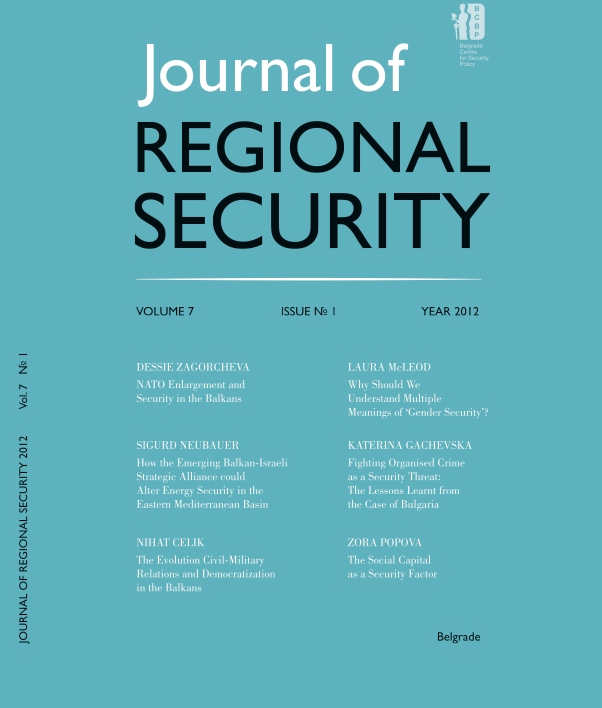Why Should We Understand Multiple Meanings of ‘Gender Security’?
Abstract
Research concerned with language and meanings is often thought to be less useful and less policy-relevant than research utilising instrumental approaches. This article explores how a deeper understanding of the variety of meanings about ‘gender security’ in relation to Security Council Resolution 1325 can be useful to practitioners. An analysis of three initiatives related to SCR 1325 in Serbia demonstrates that different post-conflict personal-political imaginations leadtoverydifferentinterpretationsof‘gendersecurity’,shapingthesubsequentpolicydesigned to implement SCR 1325. Investigating how (potentially conflicting) ‘gender security’ policy is made is useful to practitioners as it enables us to go some way towards creating a policy that would be meaningful and significant to all stakeholders.
References
BFPE (Belgrade Fund for Political Excellence). 2010. United Nations Security Council Resolution 1325 in Serbia – On women, Peace and Security: Recommendations for drafting National Action Plan for Implementation of UN Security Council Resolution 1325 in Serbia. Belgrade.
Cohn, Carol. 2008. “Mainstreaming Gender in UN Security Policy: A Path to Political Transformation?” In Global Governance: Feminist Perspectives, edited by Shirin M. Rai and Georgina Waylen, 185–206. Basingstoke: Palgrave.
GAPS UK. 2010. ‘Position Paper: Publication of the UK National Action Plan on Women, Peace and Security’. Accessed 31 May 2012. http://www.nowomennopeace.org/images/stories/ GAPS_Position_Paper_Publication_of_the_UK_NAP_on_Women_Peace_and_Security.pdf.
Dillion, Michael. 1996. Politics of Security: Towards a Political Philosophy of Continental Thought. London: Routledge.
Dokmanović, Mirjana. 2008. Firearms Possession and Domestic Violence in the Western Balkans: A Comparative Study of Legislation and Implementation Mechanisms. Belgrade: SEESAC.
Enloe, Cynthia. 2000. Bananas, Beaches and Bases: Making Feminist Sense of International Politics. Berkeley: University of California Press.
Gumru, F. Belgin, and Jan Marie Fritz. 2009. “Women, Peace and Security: An Analysis of the National Action Plans Developed in Response to UN Security Council Resolution 1325.” Societies Without Borders 4 (2): 209–225.
McLeod, Laura. 2011. ‘Configurations of Post-conflict: Impacts of Representations of Conflict and Post-Conflict upon the (Political) Translations of Gender Security Within UNSCR 1325.” International Feminist Journal of Politics 13 (4): 605–622.
Obradović–Wochnik, Jelena. 2009. “Knowledge, Acknowledgement and Denial in Serbia’s Responses to the Srebrenica Massacre.” Journal of Contemporary European Studies 17 (1): 61–74.
Olonisakin, Funmi, Karen Barnes, and Eka Ikpe, eds. 2011. Women, Peace and Security: Translating Policy into Practice. London: Routledge.
Shepherd, Laura. 2008. Gender, Violence and Security: Discourse as Practice. London: Zed Books.
Shepherd, Laura. 2010. “Women, Armed Conflict and Language – Gender, Violence and Discourse.” International Review of the Red Cross 92 (877): 143–159.
Subotić, Jelena. 2010. “Explaining Difficult States: The Problems of Europeanization in Serbia.” East European Politics and Societies 24 (4): 595–616.
Walters, William. 2002. “Social Capital and Political Sociology: Re-imagining Politics?” Sociology 36 (2): 377–397.
Women in Black. 2010. “Women in Black Activities and Important Documents Related to the Implementation of the Resolution 1325.” Accessed 26 July 2010. http://www.zeneucrnom.org.
Zajović, Staša. 2007. Always Disobedient. Belgrade: Women in Black.
Authors retain copyright of the published papers and grant to the publisher the non-exclusive right to publish the article, to be cited as its original publisher in case of reuse, and to distribute it in all forms and media.
The published articles will be distributed under the Creative Commons Attribution 4.0 International License (CC BY). It is allowed to copy and redistribute the material in any medium or format, and remix, transform, and build upon it for any purpose, even commercially, as long as appropriate credit is given to the original author(s), a link to the license is provided and it is indicated if changes were made. / The published articles will be distributed under the Creative Commons Attribution ShareAlike 4.0 International license (CC BY-SA). It is allowed to copy and redistribute the material in any medium or format, and remix, transform, and build upon it for any purpose, even commercially, as long as appropriate credit is given to the original author(s), a link to the license is provided, it is indicated if changes were made and the new work is distributed under the same license as the original.
Users are required to provide full bibliographic description of the original publication (authors, article title, journal title, volume, issue, pages), as well as its DOI code. In electronic publishing, users are also required to link the content with both the original article published in Journal of Regional Security and the licence used.
Authors are able to enter into separate, additional contractual arrangements for the non-exclusive distribution of the journal's published version of the work (e.g., post it to an institutional repository or publish it in a book), with an acknowledgement of its initial publication in this journal.
Authors are permitted to deposit author’s pre-print / author’s post-print (accepted version) / publisher's version (PDF) of their work in an institutional repository, subject-based repository, author's personal website (including social networking sites, such as ResearchGate, Academia.edu, etc.), and/or departmental website prior or during the submission process / at any time after the acceptance of the manuscript / at any time after publication.
Full bibliographic information (authors, article title, journal title, volume, issue, pages) about the original publication must be provided and links must be made to the article's DOI and the license.

